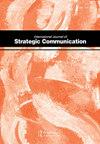试论政府机构危机沟通的合法性
IF 1.9
Q1 COMMUNICATION
International Journal of Strategic Communication
Pub Date : 2022-12-26
DOI:10.1080/1553118X.2022.2127358
引用次数: 1
摘要
政府在许多方面对公众行使权力。一个明显的例子是在社会危机中,政府机构进行有目的的战略沟通,发布限制和建议,并依靠人们的遵守来达到应对目标和满足社会需求。在这里,权威和合法性问题至关重要。在本研究中,我们对如何配置这种权力感兴趣,并分析了政府机构在2019冠状病毒病大流行期间采用的战略沟通中合法性的不同维度。根据每日新闻发布会问答环节的经验数据,我们研究了在政府机构和记者之间的互动过程中,务实、道德和认知合法性是如何受到挑战和捍卫的。我们的分析显示了合法性的所有三个维度是如何共存并相互加强的。然而,在这一合法化过程中,相当大的分量可以归因于务实的维度,在这一过程中,政府机构依赖于基于知识的描述(有)和关于需要做什么(我们必须做什么)的命令。这一实证贡献提高了我们对合法性概念的理解,以及战略沟通对当代政府权力行使的核心作用,而当代政府权力的行使依赖于合法性过程。本文章由计算机程序翻译,如有差异,请以英文原文为准。
Examining Legitimacy in Government Agencies’ Crisis Communication
ABSTRACT Governments exercise power over the public in many ways. One clear example is during societal crises when government agencies engage in purposeful strategic communication, issue restrictions and recommendations, and rely on people’s compliance to reach response objectives and meet needs in society. Here, issues of authority and legitimacy are crucial. In this study, we are interested in how this power is configured, and we analyze different dimensions of legitimacy in the strategic communication employed by government agencies during the Covid-19 pandemic. Drawing on empirical data from Q&A sessions of daily press briefings, we examine how the pragmatic, moral, and cognitive legitimacy was challenged and defended in the interactive process between government agencies and journalists. Our analysis shows how all three dimensions of legitimacy co-exist and reinforce one another. However, considerable weight can be ascribed to the pragmatic dimension in this process of legitimation, in which government agencies rely on knowledge-based descriptions (there is) combined with imperatives regarding what needs to be done (we must). This empirical contribution improves our understanding of both the legitimacy concept and how strategic communication is central to the exercise of contemporary government power, which relies on processes of legitimation.
求助全文
通过发布文献求助,成功后即可免费获取论文全文。
去求助
来源期刊

International Journal of Strategic Communication
Social Sciences-Sociology and Political Science
CiteScore
3.40
自引率
0.00%
发文量
39
期刊介绍:
The International Journal of Strategic Communication examines the philosophical, theoretical, and applied nature of strategic communication, which is “the purposeful use of communication by an organization to fulfill its mission.” IJSC provides a foundation for the study of strategic communication from diverse disciplines, including corporate and managerial communication, organizational communication, public relations, marketing communication, advertising, political and health communication, social marketing, international relations, public diplomacy, and other specialized communication areas. The IJSC is the singular forum for multidisciplinary inquiry of this nature.
 求助内容:
求助内容: 应助结果提醒方式:
应助结果提醒方式:


